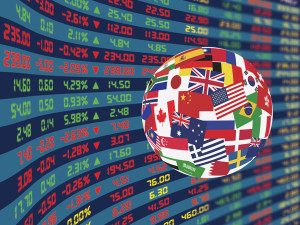Prepared by Jeff Halley, Senior Market Analyst
Global markets gently simmer
Right now, the only game in town is from a macroeconomic perspective – the outcome of the US-China trade talks. Until the world’s two largest economies conclude an agreement (or not), it will be difficult to gauge a clearer picture of the global economy in 2019. Data suggests the world’s industrialised economies (including China) are slowing, which shouldn’t surprise anyone after a ten-year QE-induced bull run. The outcome of the trade talks, (and perhaps the US/Eurozone will likely follow) will dictate whether we will gently roll down the slope or off the edge of the cliff.
Markets have a short attention span, and as bureaucrats on both sides quietly go about their business, they tend to lose patience and focus. It’s a bit like giving a hyperactive child a triple espresso. The result tends to be lots of noise and short-term volatility but as the day ends not much has changed. Short-term money chases headlines and data but moves to the sidelines as the session ends.
This has been the story in recent times and yesterday was no exception. Brexit-induced volatility yesterday saw the pound (GBP) gyrate in a near-3% intra-day range, but as the dust settled, GBP closed only 0.6% lower with the FTSE 100 rising a benign 0.3%.
Similarly, US core CPI came in ever so slightly lower at 2.1% (expected 2.2%) which saw Wall Street rise and US-10-year bonds dip below 2.60% and the greenback give back some of its gains.
Asia’s focus will turn to Japan machine orders data this morning before US durable goods this evening.
We can expect much hand-wringing analysis on Brexit today following the rejection of UK Prime Minister May’s latest deal by the House of Commons. My tuppence is that Parliament has, in their own mind, seized control of the Brexit process and will duly ask and likely get an extension to the 29 March exit date. The breathing space granted will be used by whomever to renegotiate a more palatable Brexit deal for the UK. Except nobody has asked the Europeans yet. A short-term gain may yet belie long-term pain.
FX
The dollar fell overnight, tracking lower US treasury yields following a softish US CPI print. The dollar index fell 0.3% with the Euro (EUR) a notable gainer, rising 50 points to 1.1290. The single currency was also buoyed by the UK Brexit vote, which decreased the likelihood of a hard exit substantially.
GBP gyrated wildly in a 2.3% range between 1.3000 and 1.3300 on Brexit headlines and hot money flows, closing in New York at 1.3080. The street is assuming that a no-deal Brexit in any form is off the table now and the price action yesterday suggests they are looking for excuses to buy and not sell. This could make the upside more vulnerable to sudden spikes. As I have repeated ad nauseam, this could be a dangerous game, so traders would do well to stay light and nimble.
Elsewhere, Asian currencies could carve out small gains as lower US bond yields and the dollar support emerging markets.
Equities
Wall Street closed mostly higher with the S&P rising 0.3 % and the Nasdaq 0.45%. The Dow Jones fell 0.4 % weighed down by another significant fall in Boeing’s stock, as an ever-increasing group of countries (including China and the Eurozone) ground the 737-Max aircraft.
Asian equities will probably follow Wall Street’s lead higher initially, with Japan data closely watched on a slow news day for the region.
Oil
Both Brent crude and WTI had sideways trading days as the attention of traders was focused elsewhere. Brent rose only 0.1%, implying Asian energy markets are in for a quiet start.
Gold
Gold recaptured the 1,300 handle overnight. A weaker dollar and falling bond yields mixed in with some Brexit volatility saw the yellow metal rise USD8 to 1,301.50 dollars an ounce. The technical charts show strong support is in place at the 1280 area. Ongoing UK volatility and lower yields could see gold continue to benefit.
